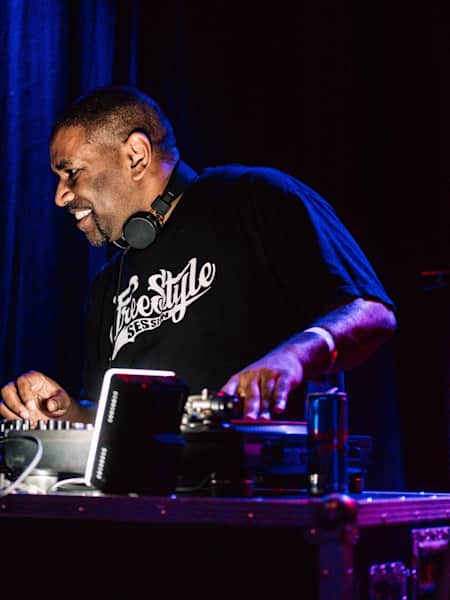Breaking
All true dancers know that the DJ is one of the most important elements of an event. They're usually situated a little bit away from the battle on an elevated platform or behind a booth, with one headphone on, mixing up a storm. Fuelling the battles, playing tracks that hype the crowd, dropping the judges' showcase tunes… DJs are the music and without them there would be no event, yet a whole jam can go by without people paying proper attention to the DJs and the work they put in.
So here are 8 facts about DJs that show why they deserve our respect:
1. The DJ is the driving force of every dance event
This might seem obvious, but it's an important fact that dancers might rarely pay attention to. Think about it like this: have you ever been to an event when everything is still being set up and the public haven't been let in yet? Any dancers in the place are usually sitting around, stretching, chatting and waiting for one thing; the DJ to drop that first track. And when the DJ does, the whole mood of the place suddenly changes and it comes to life with dancers getting down.
2. DJs were the creators and inspiration for breaking
It was DJs (Kool Herc credited as the first) who inspired B-Boys and B-Girls to create the breaking dance form. Spinning two copies of the same record to extend the breakdown of the track (the break) is what sent partygoers in the Bronx crazy back in the '70s, and got them to start breaking. If the DJs didn't mix and extend those breakbeats, breaking would never have started.
3. DJs used to hide the names of their records
Before DJ programs like Serato and track-identifying apps, DJs still had to bring all their records to events to spin. And to make sure that no one knew the tracks from which they got their breaks, they'd cover the labels of their records. This kept the origins of their breaks secret and meant that they were the only ones playing that particular breakbeat, keeping their DJ sets fresh and unique, and making them famous for the tracks that only they played.
4. DJing is digging
Party DJs play tracks that audiences know and want to party to, but to be a battle DJ is to find tracks that other DJs aren't playing and dancers might not have heard yet. So, true DJs do what's known as digging. This term refers to when DJs go to record stores and dig through crates of records, searching for new music to add to their sets when spinning. To be a good, fresh DJ with your own tracks you had to dig to find music that would set you apart from the other Disc Jockeys. True DJs are always digging, now both in record stores and online.
5. DJs used to be the people that everyone came to see battle
Long before organised hip-hop culture dance battles, it was actually the DJs who battled! In the '70s, when hip-hop parties were taking off, and even before that in Jamaica, a place heavily linked to the birth of hip-hop culture, when the urban music scene was growing, DJs would have crews and spend money on massive, room-shaking sound systems and speakers. It then became a regular thing to have two DJs, with their crews, set up their sound systems at a party and see who could blast out the other with their sound. Partygoers would come to hear, see and dance to this DJ soundclash.
6. A lot of famous break DJs are high-level B-boys
A lot of breakers might not know that the individuals DJing their battles are fire on the dance floor as well as on the decks. A lot of DJs are actually B-boys and B-girls who are highly respected for their skills in the art of breaking.
These include:
- DJ Lean Rock – a member of the legendary Floorlords crew.
- DJ Nobunaga – a member of the well-known Dutch crew EXG.
- And DJ Scream – a member of South Front crew from Ukraine.
7. The DJ needs to see the battle area
This is a very simple fact that many don't seem to be aware of. It is commonplace at events for dancers and audiences to stand in front of the DJ booth and block the DJ's view, either forgetting or being unaware that the DJ needs to see the battle. This is for many reasons, like:
- So the DJ knows when to switch tracks for each dancer's round.
- So they know when the battle starts and finishes, which stops them using up a new track if there's only a few seconds left.
- They also need to see when judges do their showcase round, again needing to switch tracks for each judge.
- Plus, it's now common for DJs to play entrance music for each competitor as they enter the battle area.
If a DJ can't see the battle area, they're effectively working blind. So next time you're at an event and think that that empty space in front of the DJ booth is a great place to stand and watch the battles, don't do it. There's a reason that space is empty.
8. DJing is an art form that takes as much skill as dance
DJing is a highly skilled, technical art form. Just like the dance, it has foundations and a deep history. It takes hours and years of practice and involves a high level of musical knowledge, understanding and feel, as well as knowledge of the dance that a DJ is spinning for. Mixing, cutting, creating, and more; DJing isn't easy.








